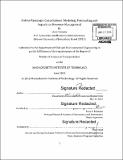Airline passenger cancellations : modeling, forecasting and impacts on revenue management
Author(s)
Petraru, Oren
DownloadFull printable version (20.36Mb)
Other Contributors
Massachusetts Institute of Technology. Department of Civil and Environmental Engineering.
Advisor
Peter P. Belobaba.
Terms of use
Metadata
Show full item recordAbstract
Passenger demand forecasting, and subsequently passenger cancellation forecasting, are important components in any airline revenue management (RM) system. Passenger cancellations can potentially lead to flights leaving with empty seats and thus to loss of revenues. Airlines need accurate cancellation forecasting tools in order to properly compensate for cancellations, or in other words, overbook flights above their physical capacity. At the same time, airlines need to be cautious not to overbook too aggressively. If a flight is still overbooked at time of departure, not all passengers are able to board and those left behind need to be compensated and re-accommodated. This thesis focuses on modelling and forecasting passenger cancellations using the PODS booking simulation tool. Several methods for cancellation forecasting and overbooking are presented and their impacts are tested under different demand, competition and RM strategy settings. All methods are based on time series modeling of historical observations. However, the methods differ in terms of the data they use and the canceled bookings they compensate for. The potential contribution of Passenger Name Record data (PNR) to more accurate cancellation forecasting is discussed as well. Simulation results indicate that the ticket revenue gains due to cancellation forecasting and overbooking range between 1.15% and 4.16%, depending on the cancellation forecasting method used and the level of overbooking aggressiveness. However, aggressive overbooking increases the negative effect on revenues due to the costs associated with denied hoardings. Therefore, after taking into account these costs, the net revenue gains range between 0.06% and 2.79%. For airlines with high cancellation rates, the magnitude of the gains from cancellation forecasting and overbooking is even greater, reaching 3.59% in net revenue improvements.
Description
Thesis: S.M. in Transportation, Massachusetts Institute of Technology, Department of Civil and Environmental Engineering, 2016. Cataloged from PDF version of thesis. Includes bibliographical references (pages 123-125).
Date issued
2016Department
Massachusetts Institute of Technology. Department of Civil and Environmental EngineeringPublisher
Massachusetts Institute of Technology
Keywords
Civil and Environmental Engineering.